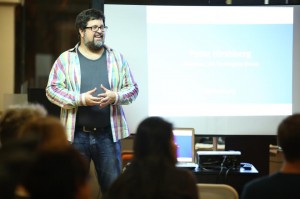Amazing how much talk there has been about what Web 2.0 means over the last couple of weeks. I suppose it is only natural given the upcoming Web 2.0 Conference, but I think it is more than that.
Christopher Allen mentioned this idea when registering the other day, he is interested in talking about how a number of “same time, different place” ideas/companies are bubbling up. Honestly, I think this is just the first time we have really been able to prove the actual existence of the “collective consciousness” to which we are all connected. The difference is that now we have real time monitoring tools for us to become aware of the work of other’s and the network effect has increased the velocity with which the situations arise in distant places simultaneously. Lastly, and most importantly, is the impact of thousands of free open source components, the nearly free tools and the low cost of deployment that are characteristics of Web 2.0.
During the early Internet days, I was fond of talking about the organic, self-expanding nature of the Internet itself. That the tools let people talk about how to use the tools. That tool users connecting with others who liked to use the tools would naturally lead to more people using more tools and the ever expanding nature of the Internet was built into the core of the system. The philosophy of sharing that came from DARPA was infused into the soul of the system, and the agents that spread the word, also planted the seeds of the values we are finally realizing today in what we call Web 2.0.
Rather than trying to summarize all the great pieces on What Web 2.0 is, or getting in deep trying to explain Web 2.1, I have a very simple definition of Web 2.1 is for the purpose of the Web 2.1 BrainJam on Friday.
Web 2.0 is about the technology. Web 2.1 is about people using the tehchnology.
I went ahead and created an entry on Web 2.1 on Wikipedia where we can all work on this together, but in short I think we need to think of it in terms of the Chasm and positioning Web 2.1 as the entry point for the majority of society. I was speaking with Will Pate over lunch a short while ago when this really hit home. Even at the Blog Business Summitt there were people who did not know what RSS means and many people think Bloggers are a new form of geekdom rather than realizing that they are really TruthTellers who care enough about the world (and often their egos) to invest in writing each day. I even know of a person who thought she could not listen to podcasts because she did not have an iPod. We need to all stop talking tech and start talking to people in terms they understand.
This sort of technology-centric thinking is only natural from the innovators, inventors and tinkerers, but ultimately it is this key aspect of Web 2.0 that must change. Every developer talks about user-centric design and many others even have better processes for incorporating user feedback than ever before, but making that happen in the real world is tough work – especially when it goes against someone’s natural way of being. Dont get me wrong, there is nothing wrong with this, but it is something that must change for us to move to Web 2.1 and beyond.
Not that marketing-centric thinking is much better. Given an unusually high procilivity for promising technically impossible changes or product features, it is no wonder developers and sales/marketing people have not gotten along well historically. But now, as we stand at this new dawn, we all need to come together to change our perspective and get beyond our own prejudices. We need to understand our own strengths and respect the strengths and weaknesses of others in order to approach our products and problems with a whole mind.
A common mistake I saw in corporations when it came to Web related projects was a desire to pick the technology first rather than understanding the situation and the needs of the people involved. This has been happening quite a bit in the open source community and should continue as it is an invaluable process of discovery that has produced incredible breakthroughs.
What I want to see from Web 2.1 in contrast to this are projects being driven by human needs instead of technical possibilities. Where a situation is considered in detail by a group of whole mind directed thinkers who love each other and what they do, but have a unique contribution of skillsets for the actual work at hand.
Web 2.0 is about technology. Web 2.1 is about people using technology.
It is that simple really, and it is the reason I will be going to Recovery 2.0 on Thursday night instead of doing more work on Web 2.1: A BrainJam for the rest of us.
Apparently Rick Segal agrees – I just saw his post moments after first submitting this one…
Tech Tags: web+2.0 web2.0 web2.1 web2point1 web+2.1 brainjam brainjams blogoposium1 Web2.1BrainJam
